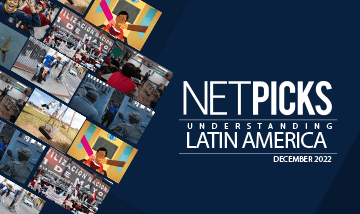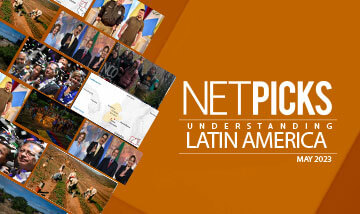Índice
Understanding Latin America
Dear readers and colleagues, this month we bring you five articles that reflect the reality of Latin America: one each from Mexico, Brazil, the Dominican Republic, one on failing policies to protect the Amazon rainforest and another on the first regional conference for the far-right in Latin America.
This is our last newsletter of the year. After a short break, we will resume our monthly newsletter in February 2023. We wish you enjoy the holidays and have a great new year!
- In Mexico, workers are struggling for independent unionism
- Stormy times in Brazil
- Widespread panic as anti-Haitian Decree goes into effect in Dominican Republic
- Legal frameworks to protect the Amazon are being sorely tested
- The other Americans: CPAC comes to Latin America
.
IN MEXICO, WORKERS ARE STRUGGLING FOR INDEPENDENT UNIONISM
In May of 2019, Mexico’s President Andrés Manuel López Obrador (AMLO) signed into law a sweeping package of labor reforms, which could change the course of workers’ rights in country after decades of labor abuses, corrupt unions and crackdowns against workers’ rights protesters. Implementation of the new reforms has been painfully slow, but there is reason to be optimistic, says the author. Modern Mexico was built on the back of the labor struggle, ever since two violently oppressed workers’ strikes in the mining and textile industries at the turn of the 20th century helped spark the Mexican revolution of 1910. This caused important labor protections to be enshrined in the 1917 Constitution. But by the 1930’s, the emerging hegemon of the Institutional Revolutionary Party (PRI) was busy grouping workers in the worker, campesino, and popular sectors, each with their own confederations and all of them fully subservient to the ruling party. This kicked off the era of union simulation. The next decades were marked by backdoor meetings between chummy company and union bosses, or paid goons and labor boards stymying attempts at forming independent organizations. Other policies and deals, like the 1994 NAFTA deal, lead to increased precariousness, layoffs and working hours while wages plummeted, and workers’ rights activists were jailed or punished. Some labor movements have already achieved small victories due to these reforms, but AMLO and his MORENO party could be doing more to promote and support this uphill struggle, says the author. Learn more about these reforms, recent labor victories in Mexico, and AMLO’s potential role in the labor struggle in the article below.
Kurt Hackbarth, November 26, 2022
https://jacobin.com/2022/11/mexico-independent-workers-unions-fight-amlo
.
STORMY TIMES IN BRAZIL
When the left-wing candidate Luiz Inácio “Lula” da Silva officially won Brazil’s elections at the end of October, supporters cheered and celebrated. Representatives from social movements stood next to PT party members on stage as Lula made his victory speech, hopeful for change. The current President Jair Bolsonaro left a grim legacy, affecting a large portion of the Brazilian population. He cut social programs, weakened unions, refused to raise the minimum wage despite rising inflation, and promoted the economic development, and thereby the destruction, of the Amazon rainforest. Lula will be sworn into the presidency on January 1, 2023, but here, the author asks three pressing questions: How do things stand in Brazil after almost four years of Bolsonaro? What hopes does the left have for Lula and how much room for manoeuvre will there be for left-wing politics? What role will social movements play during Lula’s presidency? Many people are expecting a 180-degree change from the country’s current path, but this won’t be easy. Not only because Bolsonaro continues to see strong support in the country, but also because of the PT party’s own controversial legacy and seeming contradictions. When Lula was previously in office, he solidified ties with large-agribusiness, and this year –in the bid to win the election– he has also stated publicly his stance against abortion, to name only two examples. Today, nearly all of the current leadership of his PT party are white, putting into doubt their ability to break away from Bolsonaro’s racist tone. Social movements were careful not to criticize Lula during the campaign, but how is their relationship to the new government going to unfold?
Niklas Franzen, December 2, 2022
https://www.rosalux.de/en/news/id/49546/stormy-times-in-brazil
.
WIDESPREAD PANIC AS ANTI-HAITIAN DECREE GOES INTO EFFECT IN DOMINICAN REPUBLIC
Videos have flooded out of the Dominican Republic over the past month showing security forces corralling Haitian people outside their homes and loading them into cages on migrant control trucks to be placed in detention centers or deported. These arrests are a drastic ramp-up of President Luis Abinader’s anti-Haitian policies, which have been enabled through the Decree 688-22 issued in November, but has yet to be signed into law. A large number of Haitians living in the Dominican Republic are seeking better living conditions and jobs, as their own country goes through a political and economic crisis that has given rise to obscene levels of violence. Between July and October of this year, more than 43,000 migrants, mostly Haitian, were deported from the Dominican Republic, according to the Dominican government. The number of deportations increased by 50 percent between September and October. The Decree has also made life more dangerous for Haitians in the Dominican in other ways, as people pose as migration officials to extort or steal from them. How did the two nations who share a small island get to this point?
Carlos Edill Berríos Polanco, November 17, 2022
https://www.latinorebels.com/2022/11/17/antihaitiandecree/
.
LEGAL FRAMEWORKS TO PROTECT THE AMAZON ARE BEING SORELY TESTED
Environmental crime thrives across the Amazon, everything from poaching, or illegal mining and logging that have led to soaring deforestation. Some states have made efforts to combat these illicit activities, but corruption, lack of political will, and limited articulation between public agencies also dominate the region, thwarting real efforts to stop forest destruction. The authors studied the environmental legislative framework of various Amazon countries, and found contradictions, ambiguities, and legal gaps in most of them. In Bolivia, for example, a number of laws are in place to target environmental crime, but legal gaps mean that perpetrators are rarely punished. Several progressive environmental policies exist in Venezuela, like the Organic Environmental Law of 2006 that lays out constitutional rights to a safe, healthy, and ecologically-balanced environment for all. However, the government of Nicolas Maduro has not fulfilled this right. In many cases, environmental datasets have also been hidden from public view, making it hard to identify the magnitude of the problems and appropriate solutions. The researchers also found that these countries fail to cooperate between themselves to tackle environmental crime in the Amazon, multilateral effort that is clearly needed. Read more bellow for more details of how states are failing to protect the Amazon, considered the lungs of the earth, and what role states, NGO’s, and civil society could play in this process.
Insight Crime, November 8, 2022
https://insightcrime.org/investigations/legal-frameworks-protect-amazon-sorely-tested/
.
THE OTHER AMERICANS: CPAC COMES TO LATIN AMERICA
Many have written about a new pink tide in Latin America, as several leftist governments have recently been elected into office across the region. But conservative voices have also been organizing, refusing to admit defeat. In November, Mexico hosted the first Latin American Conservative Political Action Conference (CPAC) gathering far-right voices from the across the hemisphere to share ideas and strategies. Anti-communist, anti-left, anti-abortion, and anti-LGBTQ+ agendas were all major themes of the convention, as well as spreading messages of Christian Nationalism, writes the author. Donald Trump addressed the conference in a video message, celebrating the convergence of the far-right. U.S. Senator Ted Cruz, and Trump’s former Chief Strategists, Steve Bannon, also left video messages. Other speakers included Eduardo Bolsonaro, son of the outgoing Brazilian President Jair Bolsonaro and controversial Guatemalan President Alejandro Giammattei. Since Giammattei took office in January 2020, at least twenty-five judges, prosecutors, investigators, and activists who have worked on corruption cases have been forced to flee into exile, or faced criminal prosecution for their work. The expansion of the CPAC model into Latin America is just another example of the U.S. far right’s outreach in the region, says the author. Are conservative political views gaining as much traction in Latin America as the leftist progressive ones?
Jeff Abbott, November 23, 2022
https://progressive.org/latest/other-americans-cpac-comes-to-latin-america-abbott-231122/





